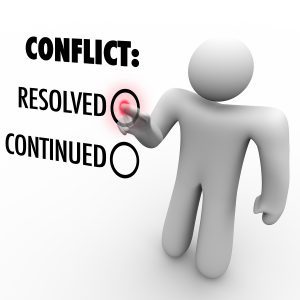 The guy running the project was honest; brutally honest in fact. He said he’d done his time in the military, took his degree, his rank and his time in and hooked on with a federal agency that he barely knew existed before he joined it. He was interested in getting to early retirement and benefits with as little hassle and drama as possible and told me that my job was to keep this little problem off of his back and away from his reputation. I paraphrased what I was hearing by candidly asking, “You want to just kick this down the street till you move out of this office and somebody else inherits it?” “That’s about the size of it,” he replied. He wasn’t really interested in resolving THE conflict as much as HIS conflict. I’m not judging and not all of the people we work for are as candid as this guy was, but my sense is the sentiment is more common than not.
The guy running the project was honest; brutally honest in fact. He said he’d done his time in the military, took his degree, his rank and his time in and hooked on with a federal agency that he barely knew existed before he joined it. He was interested in getting to early retirement and benefits with as little hassle and drama as possible and told me that my job was to keep this little problem off of his back and away from his reputation. I paraphrased what I was hearing by candidly asking, “You want to just kick this down the street till you move out of this office and somebody else inherits it?” “That’s about the size of it,” he replied. He wasn’t really interested in resolving THE conflict as much as HIS conflict. I’m not judging and not all of the people we work for are as candid as this guy was, but my sense is the sentiment is more common than not.
A lot of the political pundits are describing the U.S. conflict resolution definition for Syria in a similar fashion. Whose conflict was resolved in staying out of it? I guess time and history will decide.
Conflict is inevitable, resolving it is not. It seems odd and ironic that my partners and I in The Participation Company (TPC) – a group of people who actually resolve other’s conflicts for a living — have a hell of a time resolving our own rather insignificant internal business conflicts from time to time. Deciding if and when a conflict has actually been resolved can be … conflicting.
Our clients and the public that they serve or frequently deal with have differing ideas of what the conflict actually is—so their conflict resolution definition is probably different, too. More often than not, the most challenging and time-consuming part of the gig is getting all sides on the same page in defining the problem. That usually requires lots of mini (sometimes not so mini) conflicts to resolve before we get to the granddaddy that we’re hired to help resolve in the first place. Warring factions tend to view problems and solutions in their own simple and parochial way and ignoring competing stakeholders’ issues or just dismissing them as not important. It’s only when we get the sides to recognize everyone’s problems that we can get people to work on solving them.
Beats playing kick the can.
Author: John Godec
